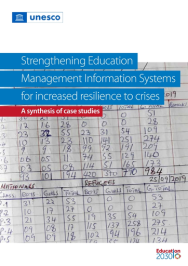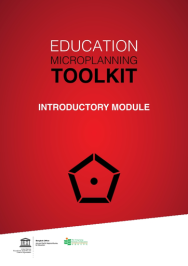
Education management, monitoring and evaluation
Education management relies on complex institutional and organizational administrative arrangements mobilizing resources such as teachers, educational infrastructures, materials, and equipment to deliver quality education services to the population. Access to accurate and timely information is critical for ministries of education to implement, monitor and evaluate administrative and educational processes.
For decades, UNESCO has been providing technical assistance and capacity development services on education management, monitoring and evaluation to Member States, mobilizing its network of field offices and specialized institutes (notably IIEP and UIS). UNESCO also promotes the development of standards, methodologies, and tools to help governments strengthen their education management capacities and setup digitalized information systems (EMIS).
Education sector management refers to the administration of the education system. Its overall goal is to create and maintain environments within education administration and educational institutions that promote, support, and sustain teaching and learning effectively and efficiently. To provide quality education, governments need to ensure availability of relevant educational services for learners on a day-to-day basis. This requires efficient institutional and organizational arrangements for mobilization of resources such as teachers, educational infrastructures, materials, and equipment, as well as strong capacities to organize and manage these resources in an optimal and cost-effective manner while ensuring that delivery of education services translates into quality learning outcomes for learners.
Inadequate management capacity at different levels of ministries of education and in schools can hinder the success of education sector reforms and plans and the delivery of quality education. Many countries face difficulties in using resources effectively to improve education services because they lack management capacity.
To be efficient, education management relies on accurate and timely information to implement, monitor and evaluate administrative and educational processes. Education Management Information Systems (EMISs) play a cornerstone role in that regard, enabling decision-makers, administrative employees, and education practitioners to access critical information required to drive their work. Information technologies offer new pathways and opportunities for education sector management and monitoring and evaluation, allowing governments to establish real-time data systems informing decisions and education practices at all levels. Yet, the global digital divide remains a reality and UNESCO advocates for the implementation of realistic and carefully designed data, monitoring and evaluation systems aligned with capacities available in countries.
For decades, UNESCO has been providing technical assistance and capacity development services on education planning, management and monitoring and evaluation to Member States, mobilizing its network of field offices and specialized institutes (notably IIEP and UIS). UNESCO promotes the development of standards, methodologies, and tools to help governments strengthen their capacities.







